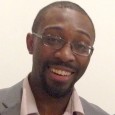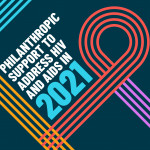It has been almost a year since I said yes. Yes, to making a change in the scope of my work. I’ve been fighting the HIV pandemic for 13 years at this point, working mainly in the domestic U.S. space and doing my part to help save my community. All while remembering that black gay men are magical, precious, earthshaking beings and that are worthy of saving. The lives of black gay, bi, and same gender loving men add the depth of our communities shaping this world for the better in ways that are both big and small. They are a community that danced with the greatness needed to change the reality and conditions of our world—reminding people of the connections that they can share with people that bring us closer together. What my community has taught me about my work, and what is worth fighting for because the struggle continues. During this black history month, I reflected on the words from two leaders in my field. These words have stuck with me and help guide my relationship to my community and the work. In the spirit of expansion, I first offer the words of warrior-poet Charles Stephens. Charles reminds us to look at the broader context as we engage in the work.
Black gay men are not merely the sum total of a series of horrible health outcomes.
Black gay men are not merely a risk group, representative of the pervasive MSM
category, but a people, with a history and a culture, a rich legacy of activism that has
meant both our survival and secured our future.
Charles is asking us to center this work within a community, more magnificent than ourselves as individuals. He reminds me that I am not walking a path alone but rather in stride with my tribe. The radical integration of community-level intervention needs to be steadfast in this commitment at all levels. We should never be comfortable because someone is being left out. And most actively call in those that represent the diversity of our community’s experience. Our job is to find ways to build bridges that bring more experiences into the conversation—drawing strength and insight from the totality that is our community. We have to embrace the pure ethic of protesting, simply being unafraid to speak the truth in public. Collectively we each play a role in the battle for our shared dream.
And that truth leads one to believe that integration has to happen at all levels. We must build a connective chain that reaches from the front line of AIDS service organizations working in the deltas of Mississippi to the halls of legislation in Washington. It is a connection from communities that share a common bond across the globe, to the multitudes of shared experiences and commonalities with a single clarion call to end the AIDS pandemic. Binding our work to that exceptional clarity of focus, ending the pandemic becomes less about a specific place and location, but about a blinding promise that speaks of our ideals. A promise of justice, equity, compassion, and health; We believe that we can end this pandemic while delivering high-quality life-extending care to those living with HIV and provide for an AIDS-free generation.
The reality is, we are all making the same claim, declaring we are here to change the world, and in doing so, we will end the AIDS pandemic. We were never limiting our imagination to simple declarations that are tied to one country. Our ask is bolder, for the kind of politics and will that galvanized people and reshaped the course of history.
Working globally reminds me that my work is rooted in the work of communities. Placed in a people, a culture, and a purpose that weaves together the connective tissues of a shared vision. It is a transformational energy that reminds us to be more intentional about our compassion. Compassion and courage that join us together. In the famous words on the founder of the Black AIDS Institute Phil Wilson:
The day will come when this epidemic is over, and when it does, it’s important for them
to know, we were not all monsters. We weren’t all cowards. Some of us dared to care in
the face of it. Some of us dared to fight because of it. And, some of us cared to love in
spite of it, because it is in the caring, fighting and loving, that we live forever.
We can dare to be bolder and forge new connections by thinking global and acting locally.
So now it becomes a question for you to consider. Will you have an expansive view of the struggles we face ending the HIV epidemic. Or will you be beholden to classical norms that limit your vision? Do we collectively have power and will to change our world for the better? And in doing so, align ourselves with a history that has already glimpsed this possibility. History has shown us what our power can do—waking the radical, compassion that stirs the giant sleeping to make people care about the lives of those they once thought to discard. But we are now asked can we rouse that power again to make people keep to the promises that they made to people a world over. Will we finish what was begun long ago finally end the epidemic of HIV? Will we bend the arc of justice to improve the lives of the vulnerable.
It will take courageous activism and compassion to move the brokers of powers we need to make this a reality with people working at the local, national, and international levels pulling together the same board goal. We have done this before and can do it, change history with a connection to the culture. So I’m asking you in some ways to join me. Working to both fight locally but think globally. Know that you are not alone in this work and that there are tens of hundreds of thousands of people all over the globe. They are making a better future for the lives of the people who are affected by HIV.
Allow yourself 5 minutes a month to think about how you can draw strength from those around you. It is the connection and expansion of our collective power that allows us to do what once was thought impossible. We are a community with a history and a narrative that reaches beyond borders. To touches people in such a way that we bend the moral arc towards justice.
Quick actions you can take to help build your global solidarity
- Get on a list; information is vital, there are a number organizations in the global space that will the support of their colleagues in the domestic area all of these have both global and local links Health GAP, AmfAR, TAG, AVAC
- Reach out on social media. There are advocates on every platform, and they love to connect with people who share a passion and vision in this work
- Demand for a bigger idea of ending the epidemic that reaches from what you need in your community to the aligned movement around the globe. You understand HIV and the effects it can have, but also you are a voice directly to the largest funder of global AIDS in the world.
- Fight like hell to end HIV in the U.S. and make a point that defeating HIV means beating it everywhere
- Take care of yourself. This work is difficult, and we have a decade to make a massive difference. We are on a tipping point, and what we do at this moment will tell history where we landed.







Comments
Comments